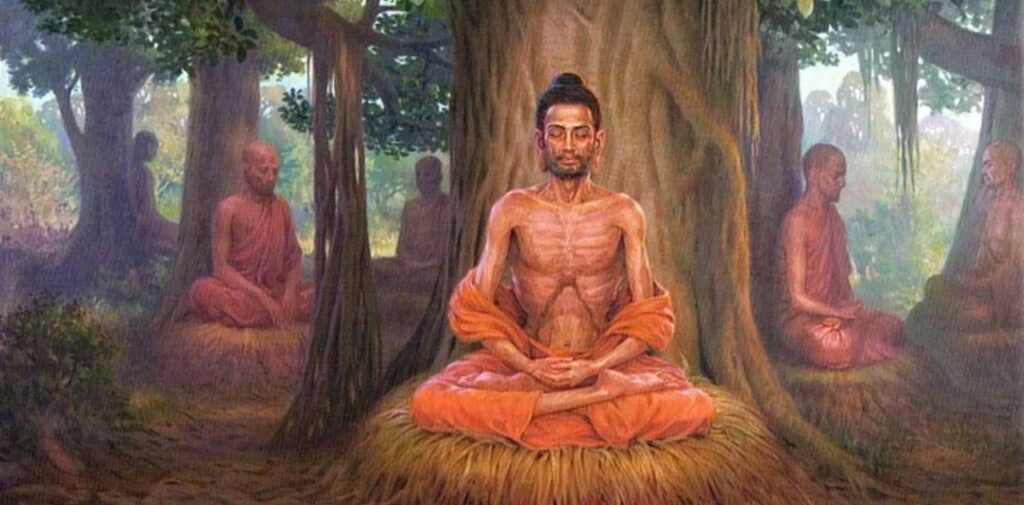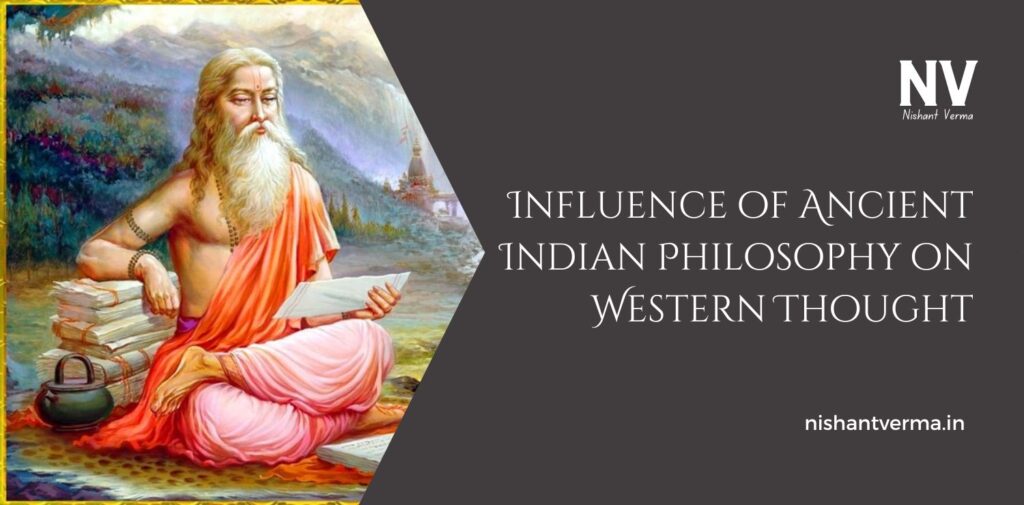India has always been a land of deep thinkers, wise teachers, and profound ideas. Over thousands of years, ancient Indian philosophy has developed rich, complex ideas about life, nature, the universe, and the self. These ideas have not only influenced the people of India but have also made their way to the Western world, shaping the way people in Europe and America think about life, spirituality, and the mind.
In this article, we will explore how ancient Indian philosophy, with its teachings on topics like the self, the universe, and meditation, has influenced Western thought and why it continues to be important even today.
What is Ancient Indian Philosophy?
Before we dive into how it influenced the West, it’s important to understand what ancient Indian philosophy is all about. Philosophy means thinking about big questions like: What is the meaning of life? Why are we here? How should we live our lives? Ancient Indian philosophers asked these questions, and over time, they developed many schools of thought, each offering its own answers.
Some of the most important schools of ancient Indian philosophy are:
- Vedanta: This is a spiritual philosophy based on the Vedas, the oldest sacred texts of India. Vedanta teaches that everything in the world is connected and that the ultimate truth is a supreme spirit called Brahman.
- Yoga: Yoga is not just about physical postures; it is also a deep philosophy that teaches how to control the mind and body to reach inner peace and spiritual growth.
- Buddhism: Founded by Siddhartha Gautama (the Buddha), this philosophy focuses on the idea of suffering, how to overcome it, and how to live a peaceful and enlightened life.
- Jainism: This philosophy teaches the importance of non-violence, truth, and self-control. Jain thinkers emphasize that everything, from the smallest insect to the largest tree, has life.
Now that we know what Indian philosophy is, let’s look at how these ancient ideas traveled to the Western world.

Early Encounters with Indian Philosophy
For centuries, the Western world knew little about the ideas coming from India. However, by the 18th and 19th centuries, Europe started to discover Indian philosophy. British colonial rule in India played a key role in this discovery because it brought Westerners to India, where they encountered Indian spiritual traditions and philosophical teachings.
Some key events that helped Indian philosophy reach the West include:
- Translations of Ancient Indian Texts: British scholars and travelers started translating ancient Indian texts, such as the Bhagavad Gita, the Upanishads, and the works of Buddhist philosophers, into European languages. These texts revealed deep insights about the nature of the self, the universe, and the purpose of life.
- The Influence of Swami Vivekananda: One of the most important figures in bringing Indian philosophy to the West was Swami Vivekananda, a Hindu monk who gave a famous speech at the Parliament of the World’s Religions in Chicago in 1893. In his speech, he talked about the unity of all religions and the importance of spirituality, which made a huge impact on the Western audience.
How Indian Philosophy Influenced Western Thought
Now, let’s look at how the ideas from ancient Indian philosophy influenced Western thinkers and ideas.
The Idea of the Self: Atman and the True Self
One of the biggest influences of Indian philosophy on Western thought is the idea of the self. In India, philosophers talked about the Atman, which is the true, eternal self. The Atman is not just the body or the mind; it is the soul, the part of us that is connected to the universe and is never destroyed.
In the West, many philosophers had ideas about the self too, but it wasn’t until they encountered Indian philosophy that they began to think differently. Western thinkers like Ralph Waldo Emerson and Henry David Thoreau became interested in the idea of the soul as an eternal and divine part of each person. Emerson, in particular, was influenced by the Upanishads, which explain the connection between the individual self (Atman) and the universal spirit (Brahman).
This idea of the self as something beyond just the physical body has had a lasting impact on Western thinkers, especially in the fields of psychology and spirituality.

Meditation and Mindfulness: Eastern Practices Meet the West
Another key influence of ancient Indian philosophy on the West is the practice of meditation. Meditation, which is an important part of Indian traditions like Yoga and Buddhism, is a way of calming the mind and finding inner peace. In ancient India, meditation was seen as a path to enlightenment and spiritual growth.
In the 20th century, Westerners began to see the benefits of meditation for mental health, stress reduction, and personal growth. The practice of mindfulness meditation, which comes from Buddhism, has become very popular in the West. Psychologists and therapists use mindfulness techniques to help people deal with stress, anxiety, and depression.
Famous figures like The Beatles also played a role in spreading interest in Indian meditation practices when they traveled to India and studied under spiritual leaders like Maharishi Mahesh Yogi.
The Concept of Karma and Reincarnation
Indian philosophy has two important ideas: karma and reincarnation. Karma is the belief that every action has consequences, and reincarnation is the idea that after we die, our soul is reborn into another body. These ideas were part of ancient Indian religions like Hinduism and Buddhism.
In the West, these concepts were not widely understood until they were introduced through Indian teachings. The idea of karma has had a big influence on Western culture, especially in the way people think about cause and effect. Many Western thinkers started to accept the idea that our actions in this life can influence our future lives or experiences.
The idea of reincarnation has also become popular, especially in spiritual circles. While the West traditionally believed in one life followed by death, many Westerners have adopted the idea of reincarnation, believing that the soul goes through many lifetimes.
Non-Violence and Ahimsa
One of the most important teachings in Indian philosophy is the principle of Ahimsa, or non-violence. This idea teaches that we should avoid causing harm to any living being, whether through actions, words, or thoughts. Mahatma Gandhi used the principle of Ahimsa in his struggle for India’s independence, and his ideas greatly influenced leaders like Martin Luther King Jr. in the United States.
In the West, the concept of non-violence became a key part of the civil rights movements. Gandhi’s influence showed Western thinkers that peaceful resistance could be a powerful tool for social and political change.

The Idea of Unity: The Connection Between All Things
Another big influence of Indian philosophy on the West is the idea that everything in the universe is connected. In ancient Indian thought, Brahman is the supreme, universal spirit, and everything in the world is part of this greater unity. The idea that the world is interconnected can be seen in the Western concepts of holism and ecology, where everything is understood as being part of a larger system.
Thinkers like Aldous Huxley and Carl Jung were deeply influenced by the idea of unity in Indian philosophy. They believed that understanding our connection to the universe could lead to spiritual growth and self-understanding.
Conclusion: The Continuing Influence of Indian Philosophy
The ideas from ancient Indian philosophy have had a lasting impact on Western thought. From the concept of the self to practices like meditation, karma, and non-violence, these teachings have shaped the way many people in the West think about life, the universe, and their own personal growth.
Today, the teachings of ancient Indian philosophers continue to inspire people around the world. Whether it’s through meditation, spiritual practices, or the quest for inner peace, the influence of Indian philosophy remains a vital part of the way people think about life and its mysteries.




